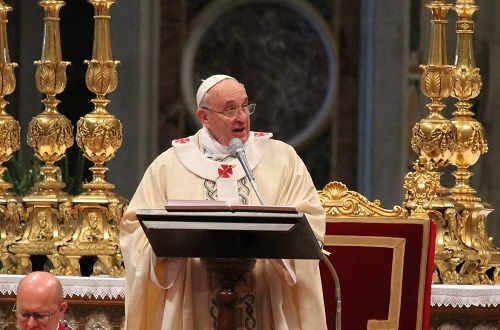In his daily homily Pope Francis dedicated his reflections to the virtue of humility, explaining that only the “outcasts” who recognize their need of God know what it means to be saved. “Jesus tells us: ‘if you do not put yourself on the margins, if you don’t feel what it is to be an outcast, you will not obtain salvation,’” the Pope observed in his March 24 daily Mass. Addressing those present in the Vatican’s Saint Martha guesthouse, the pontiff began by recalling how in the Gospel Jesus addressed his fellow citizens in Nazareth, saying that “No prophet is accepted in his hometown,” and that he could not work miracles there because the people “had no faith.” Also drawing attention to how Jesus recalls two Biblical stories of healing, one of the leper Naaman in the first reading, and the other of the meeting of Elijah and the widow of Serapta who gave him her last bit of food and was saved from famine, the Pope explained that “Lepers and widows in those days were the outcasts of society.” However, he observed that it was these two outcasts who welcomed the prophet’s words and were saved, while the citizens of Nazareth “felt so strong in their faith” and so sure of themselves that they “had no need for other salvation” the pontiff continued. “It is the tragedy of observing the Commandments without faith” noted the pontiff, describing how some say “‘I save myself because I go to the Synagogue every Saturday, I try to obey the Commandments, I do not want to hear that the leper or the widow is better than me! They are outcasts!’” “This is humility, the path of humility,” he observed, “to feel so marginalized that we need the Salvation of the Lord. He alone saves us, not our observance of the law.” Recalling how those who heard Jesus speak were “angry and wanted to kill him,” the Pope explained that this is the same anger that Naaman initially felt in the first reading, when he was asked by Elijah to bathe in the Jordan river seven times in order to be healed, thinking it to be absurd and humiliating. “The Lord asked him for a gesture of humility, He asked him to obey like a child, to be ridiculous,” the pontiff explained, adding that after Naaman walked away in anger, he returned and did as Elijah asked, and was healed by his act of humility. “This is the message for today in this third week of Lent: if we want to be healed, we must choose the road of humility,” the Pope went on to say, adding that Mary, in her canticle, “does not say she is happy because God was looking to her virginity, to her kindness or to her sweetness.” All of these are virtues which she possessed, he affirmed, but she is happy “because the Lord was looking to her humility, the humility of His servant, her smallness.” Highlighting how “This is what the Lord looks for,” the pontiff emphasized that “we must take heed of this wisdom and put ourselves on the margins so that the Lord may find us.” “He will not find us at the center of our certainties. That is not where the Lord looks. He will find us on the margins, in our sins, in our mistakes, in our need for spiritual healing, for salvation; that is where the Lord will find us.” Concluding his homily, Pope Francis expressed that “Christian humility” is not composed of “the virtue of saying: ‘I am not important’ and hiding our pride,” but rather of “telling the truth” that we are sinners. “‘I am a sinner,’” he stated, noting that “this is our truth,” however “there is another truth: God saves us. He saves us when we are on the margins; He does not save us in our certainties.” “Let us ask for the grace of having the wisdom to put ourselves on the margins” and “for the grace of humility so that we may receive the Lord’s Salvation” he prayed.

